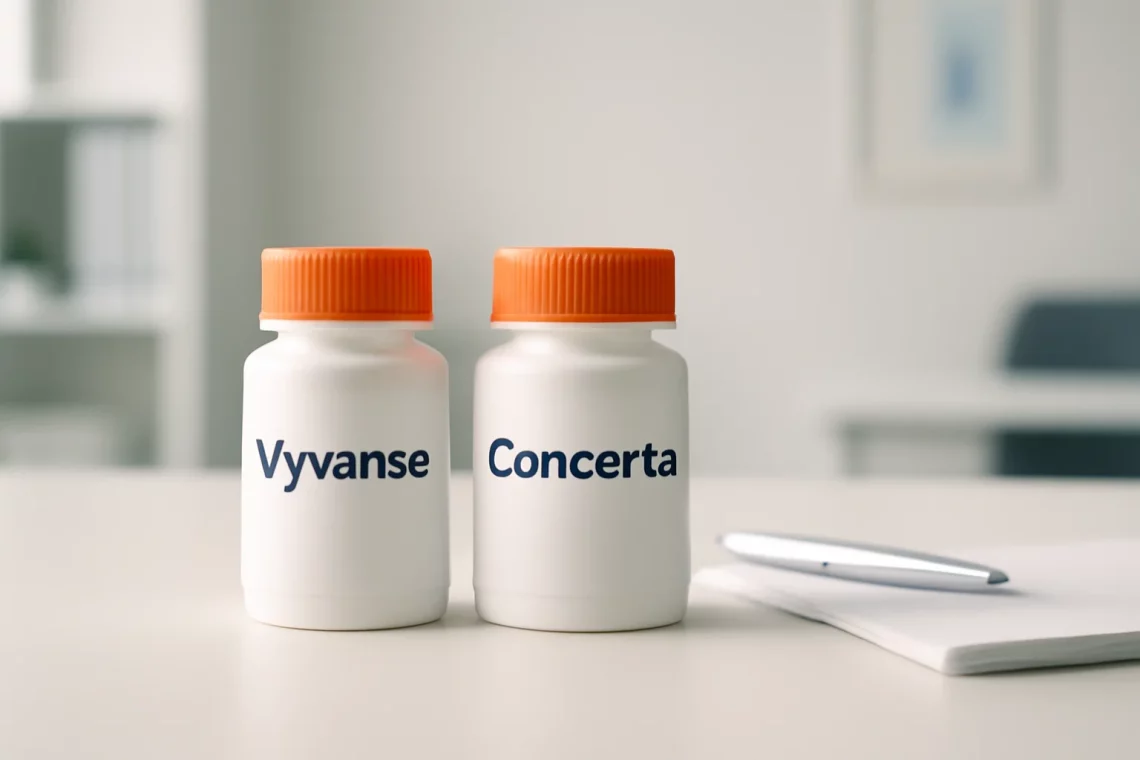
Vyvanse vs Concerta: Choosing the Right ADHD Medication for You
Vyvanse and Concerta are two of the most commonly prescribed medications for the treatment of Attention Deficit Hyperactivity Disorder (ADHD). Both medications play a crucial role in helping individuals manage their symptoms, enhancing focus, and improving overall quality of life. However, the choice between Vyvanse and Concerta can be daunting for patients and their families, as each medication has its unique properties, benefits, and potential side effects.
In recent years, there has been increasing awareness about ADHD, leading to more diagnoses and subsequent treatment options. While the effectiveness of medication is often highlighted, it’s essential to consider the individual needs of each patient. Factors such as age, lifestyle, and medical history can significantly influence the choice of medication. Additionally, understanding how these medications work, their active ingredients, and how they interact with the body can empower patients and caregivers to make informed decisions.
In this article, we will delve deeper into Vyvanse and Concerta, comparing their mechanisms, benefits, side effects, and overall effectiveness in managing ADHD symptoms. By shedding light on these important factors, we aim to provide clarity for those navigating the often complex world of ADHD treatment options.
Understanding Vyvanse: Mechanism and Benefits
Vyvanse, or lisdexamfetamine, is a stimulant medication that is primarily used to treat ADHD in both children and adults. Its unique formulation sets it apart from other ADHD medications. Vyvanse is a prodrug, which means that it is inactive until it is metabolized in the body. This slow conversion helps to create a more controlled release of the active ingredient, leading to a smoother effect throughout the day.
One of the primary benefits of Vyvanse is its long duration of action. Patients often report that they experience symptom relief for up to 14 hours, allowing for sustained focus and concentration during school or work hours. This extended release is particularly advantageous for individuals who require all-day management of their ADHD symptoms.
In addition to its effectiveness in improving focus, Vyvanse is often praised for its relatively lower potential for abuse compared to other stimulant medications. Since it must be metabolized before becoming active, the likelihood of misuse is reduced. This makes Vyvanse a suitable option for patients who may have a history of substance abuse or those who are particularly concerned about the addictive properties of stimulant medications.
However, like any medication, Vyvanse is not without its side effects. Common side effects include decreased appetite, insomnia, dry mouth, and increased heart rate. While these side effects can be bothersome, many patients find that they diminish over time as their bodies adjust to the medication. It’s essential for patients and caregivers to monitor these effects and discuss any concerns with a healthcare provider.
Overall, Vyvanse offers a promising option for individuals seeking effective management of their ADHD symptoms. Its unique formulation and long-lasting effects make it a popular choice among patients who need consistent support throughout their daily activities.
Exploring Concerta: Mechanism and Benefits
Concerta, with the active ingredient methylphenidate, is another widely prescribed medication for the treatment of ADHD. Unlike Vyvanse, Concerta is not a prodrug; it utilizes a novel delivery system known as OROS (Osmotic Controlled Release Oral Delivery System). This technology allows for a controlled release of the active ingredient over an extended period, typically lasting around 12 hours.
One of the significant advantages of Concerta is its effectiveness in improving attention span, impulse control, and overall behavioral regulation. Many patients find that Concerta helps them to remain focused on tasks, whether in an academic setting or at work, thus enhancing productivity and overall performance.
The dosing flexibility offered by Concerta is also a noteworthy aspect. The medication comes in various strengths, allowing healthcare providers to tailor the dosage to meet the specific needs of the patient. This individualization can result in optimized symptom management, as healthcare providers can adjust the dose based on the patient’s response and any potential side effects experienced.
Concerta is generally well-tolerated by most patients, but it does come with its own set of potential side effects. Some common side effects include headaches, stomachaches, decreased appetite, and sleep disturbances. As with Vyvanse, monitoring these side effects is crucial, and any concerns should be discussed with a healthcare provider to ensure the best treatment outcomes.
In summary, Concerta offers a reliable option for individuals seeking to manage their ADHD symptoms effectively. Its unique delivery system and flexibility in dosing make it a popular choice among patients and healthcare providers alike.
Comparing Efficacy and Side Effects of Vyvanse and Concerta
When it comes to choosing between Vyvanse and Concerta, understanding the efficacy and side effects of each medication is vital. Both medications have been shown to be effective in managing ADHD symptoms, but their individual experiences can vary greatly from patient to patient.
Research indicates that both Vyvanse and Concerta significantly improve attention, focus, and impulse control in individuals with ADHD. However, some studies have suggested that Vyvanse may have a slight edge in terms of duration of effect and overall patient satisfaction. Patients often report that the gradual onset and extended duration of Vyvanse lead to fewer peaks and troughs throughout the day, resulting in a more stable experience.
On the other hand, Concerta’s unique delivery system may benefit patients who prefer a medication that can be taken once a day without the need for multiple doses. This convenience can be particularly appealing for busy individuals or parents managing a child’s medication schedule.
Side effects are an essential consideration in this comparison. While both medications share common side effects, individual responses can differ. For instance, some patients may experience more pronounced appetite suppression with Vyvanse, while others may find Concerta causes more headaches. Personal medical history and lifestyle factors can greatly influence these experiences, making careful monitoring and communication with healthcare providers essential.
Ultimately, the choice between Vyvanse and Concerta should be made collaboratively between the patient and their healthcare provider. Factors such as personal preferences, lifestyle, and any previous experiences with medications should guide this decision, ensuring that the chosen treatment aligns with the individual’s needs and goals.
Making an Informed Decision: Factors to Consider
Choosing the right medication for ADHD is a significant decision that requires careful consideration of various factors. Both Vyvanse and Concerta offer effective solutions for managing symptoms, but understanding individual needs is crucial in making the best choice.
First and foremost, it’s essential to consider the individual’s age and medical history. Children and adolescents may respond differently to medications compared to adults, and certain health conditions may influence the choice of medication. Consulting with a healthcare provider who specializes in ADHD can provide valuable insights and recommendations based on the patient’s unique circumstances.
Another critical factor is the individual’s daily routine and lifestyle. For instance, students might benefit from the extended duration of Vyvanse, while busy professionals may prefer the convenience of Concerta’s once-daily dosing. Additionally, a patient’s response to previous medications can offer clues about which option may be more suitable.
Side effect profiles should also be taken into account. Patients who have experienced significant discomfort with certain side effects in the past may want to discuss alternatives with their healthcare provider. Open communication about any concerns or preferences can lead to a more tailored approach to treatment.
Finally, ongoing monitoring and follow-up appointments are crucial in managing ADHD effectively. Regular check-ins with a healthcare provider can help assess the medication’s effectiveness and any side effects, allowing for adjustments as needed.
Ultimately, choosing between Vyvanse and Concerta should be a collaborative process that takes into account the individual’s needs, preferences, and overall health. With the right support and information, patients can find the most effective treatment for their ADHD symptoms.
**Disclaimer:** This article is not intended as medical advice. Always consult a healthcare professional for any health-related issues or concerns regarding treatment options.




